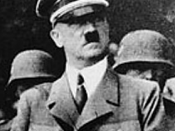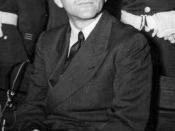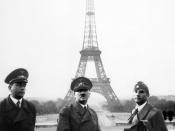Sajad Bahram Yr 12
To What extent did Albert Speer share Hitler's vision for Germany between 1933 and 1945?
Any survey of a life inevitably starts at the end. Only when the actor has left the stage do the lines emerge from the tangle of existence to form a picture. Albert Speer, born in Mannheim on 19 March 1905, is a perfect illustration of how unpredictable life is. He came from what in his day was a "normal" privileged family, of the haute bourgeoisie. His early years followed the pattern of a regulated and uneventful youth in the provinces. Nevertheless Albert Speer's true character has been an object of debate for many years as to whether he shared the same vision as Hitler, was he indeed the 'amoral technocrat' his fabricated image promoted, or Hitler's willing servant, who was fully aware of the consequences of both his own actions, and those of the Nazi regime.
Albert Speer shared Hitler's vision of Germany to some extent, and his subject was emblematic rather than anomalous in understanding how Speer embraced Hitler so unreservedly and unthinkingly, we understand how Germany could have as well.
Before taking interest and joining in the Nazi party, Speer fulfilled his family's practice as an architect under the tutelage of Professor Heinrich Tessenow. Tessenow was philosophically between modernism and traditionalism. But his influence over Speer was short-felt. Tessenow never agreed with Nazism, but most of his students did. Speer's invitation to a Nazi rally is the epitome of Hitler's immense persuasion over young minds. Speer claimed to be apolitical but like millions of others was deeply affected not only by Hitler's vision for Germany, his proposed solutions, but also by the man himself. An indication that to some extent, Speer shared Adolf's vision.
Speer's role as Hitler's architect...


